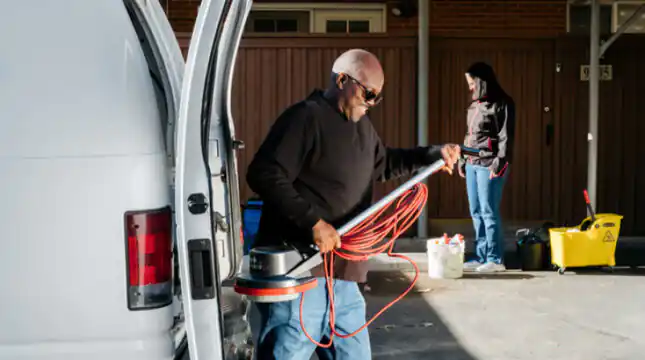Five years ago, Simileoluwa Adebajo had a high-powered job as a Silicon Valley financial analyst — but deep down, she knew it wasn’t her calling.
What made her truly happy was cooking Nigerian food for her friends.
“Seeing the look on other people’s faces, you know you’ve unlocked a whole new realm of flavor. That’s the moment that sparks joy for me,” she says.
Small dinner parties at her home soon grew into a pop-up dinner series. But she couldn’t stop thinking about the lack of Nigerian restaurants in San Francisco — which felt like an opportunity to open her own.
“Nobody else can see these dreams except for me,” she thought. “But I really want to make them happen.”
She wondered: Should I quit my job to start my own business? How do I know if it’s the right move?
Today, Adebjao is the proud owner of Eko Kitchen, which started as San Francisco’s only Nigerian restaurant and later pivoted to a catering company. Running a business took “perseverance and grit,” and there were moments she felt “extremely discouraged,” she says.
But like other small business owners who quit their jobs to pursue their dreams, she was able to succeed by following a few principles. Here's what they shared with NEXT.
Don’t quit your day job to start a business before you do these three things:
1. Focus on your passion
People don’t quit jobs to start businesses because it’s easier. They do it because it’s more meaningful.
That’s why it’s a great idea to nurture your passion before you quit your job, so that you can hit the ground running when you finally pursue it full-time.
For more than a decade before she became the full-time CEO of her popular personal finance platform Clever Girl Finance, Bola Sokunbi worked as a tech consultant — a well-paying job that she enjoyed.
But in 2015, she was a new mother of twins and started dreaming of starting her own business. “Something more legacy-focused, where my kids could say, ‘Mommy has done this,’” she says.
She started a passion project, a personal finance blog where she shared her own stories.
“How I saved money, invested money and how it’s okay to spend money on whatever is meaningful to you. And it was just really relatable, especially to other women of color,” she says.
By 2017, the site had gained enough of a following that she wrote up a business plan to quit and work on it full-time.
“You’re never going to be 100% sure that it’s the right move,” she says. “But if you don’t try, you won’t know.”
That desire is familiar to Lori Mirabelli, a child welfare worker for 21 years who always dreamed of being a full-time painter.
Five years before she quit her job, she prepared by painting as much as possible in her free time.
“I really just focused on making good art; the focus was never on selling the work,” she says.
When she felt unmotivated, she would imagine her favorite athlete.
“If Usain Bolt can work to the point where he vomits all the time, then I can keep painting,” she said. “If you want to be the best at what you do, you’ve got to put in the work.”
Those years of practice paid off.
“By the time I decided to apply for shows, I had honed my skill to where people were finding my work interesting, and started selling my work,” she says.
Before long, she was picked up by a gallery. Making money, she realized, “was the after-effect of doing something really, really well.”
2. Build up a safety net
There’s a big difference between having a side hustle you love and fully depending on it to survive.
Small business owners often say that the first year or two can be the hardest. That’s when you’re making little money while burning through funds, and doing everything you can to stay afloat.
Sokunbi says she knows “entrepreneurs who have quit their jobs without any fallback, no savings, no cash or emergency fund.”
But that creates pressure — and not in a good way. “There's lots of things happening with the business; it's high-stress. And you want to think about how you can best minimize your stress.”
Sokunbi knew her new business wouldn’t be able to replace her salary right away, so before quitting she saved up a cash buffer that could cover 12 to 18 months worth of living expenses.
“It just frees up space in your mind to focus on building your business,” she says. “I did not want my husband to bear the burden of my entrepreneurship testing. I wanted to be able to do what I was doing without any impact to our finances.”
That principle also helped Adebjao launch Eko Kitchen.
“In the first year or two, I wasn’t really making enough money. I took a lot out of my savings to be able to pay my day-to-day living expenses,” she says.
She suggests you ask yourself, “Do you have a cushion or a security blanket in terms of savings in the first year or two?”
Lori Mirabelli took a different approach. She gave herself a challenge before quitting her job.
“I had to make the same amount of money in my art career as I did in my day job, three consecutive years in a row, ” she says. And when she finally did, “I took that as a sign that the universe was telling me it’s time to go and just pursue art full time.”
3. Expect the unexpected
In early 2020, Julia Shih was feeling optimistic about her new small business. It was a year since she had quit her sales and marketing job to start her wellness store, Body + Soul Botanica, where customers loved the herbal body cream she developed for sports aches.
“I’m going to swing big,” she decided, and hired PR and marketing agencies. Immediately afterward, the pandemic struck.
“Literally within two weeks of signing those contracts, everything shut down,” she says.
There was another problem: She was suspended by her payment processor because her products contain CBD — a non-addictive ingredient in cannabis without any psychoactive effects.
“I told them CBD is legal,” she says. “But they wouldn’t respond, and withheld 100% of our transactions, claiming damages. I worked so hard to get those sales, and they just wiped out everything that I had in that account. It was psychologically devastating.”
Thankfully, Shih was prepared.
“I'm very conservative in assuming everything goes wrong, so I had enough capital,” she says. And her family encouraged her not to lose hope. “They told me, ‘Look, in the grand scheme of things, you lost a few thousand dollars. But if you build this company and it’s successful, you’re not going to worry about that.’ And that was true. If I didn’t keep going, I wouldn’t be here today.”
Around the same time over at Eko Kitchen, the pandemic forced Adebajo to close her business and lay off her staff.
Then weeks later, there was a fire. “We lost all of our inventory and equipment in that fire. I was extremely discouraged,” Adebajo says.
Thankfully, her business insurance protected her. But the next year, her insurance provider refused to renew her policy because she had made a claim.
“You want to feel that your insurance provider will fulfill a claim and also still support you,” the chef says. She’s switched to NEXT for her small business insurance, an option that gives her the speed and flexibility she needs to bring on more catering clients.
Adebajo can now focus on what she does best: Serving delicious food and helping her business grow. And that makes all the challenges worth it.
“There’s going to be more struggling in the beginning,” she says. “But I decided that I wanted a life of freedom to be able to run my own business. And I would rather struggle in the beginning with something that’s mine.”
How NEXT supports your small business growth
At NEXT, we’ve worked with 450,000 small businesses in over 1,300 professions, and we’re passionate about helping small businesses reach their goals.
We’re on a mission to make it easy to find the insurance coverage you need to protect yourself and your employees so you can build your business.
Our platform offers flexible, no-hassle business insurance. Get a quote, compare options and get your certificate of insurance online in less than 10 minutes. Our online resources and licensed advisors are always ready to help.
Start a free instant quote with NEXT.






